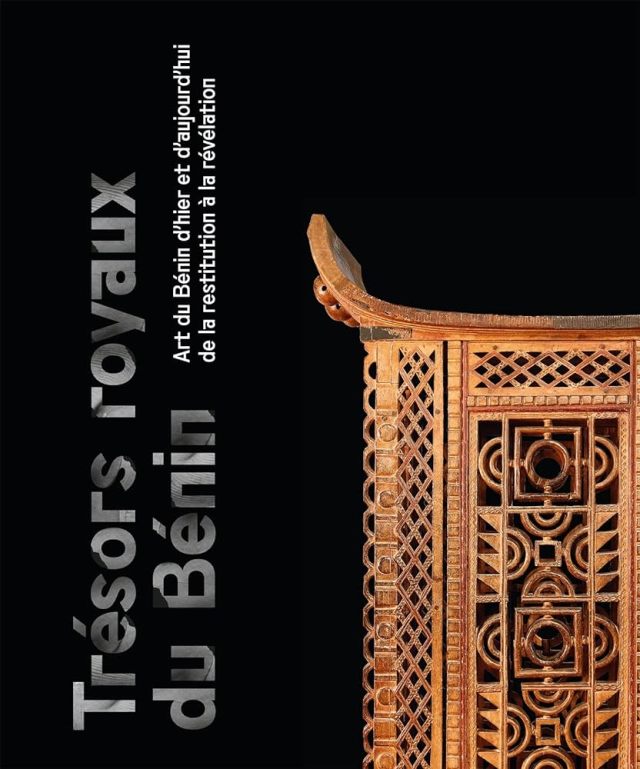The question of restitution of spoliated cultural works currently engages most European countries, especially former colonizing nations. It came into the forelight in France when President Emmanuel Macron advocated for the “return of African heritage” during a visit to Burkina Fasso in 2017. This blog post will look at the headlines of France’s handling of the question of restitution with the details of related books inserted throughout.
Macron commissioned a study by two academics, Bénédicte Savoy (then History professor at the Collège de France in Paris, now at the Technical University of Berlin) and Felwine Sarr (a writer, then Economics professor at Gaston Berger University, Senegal, now in the Romance studies department at Duke University, US). Their report on The Restitution of African cultural heritage: Toward a New Relational Ethics was published in 2018: it examined the history and current state of publicly owned French collections of African artworks originating from illicit or disputed acquisitions, as well as claims and recommendations for preparing restitutions. From a wider perspective, they recommended international and inter-African cooperation, improved access to research, archives and documentation (including through digitisations), to fill the gap relating to the preservation, study and wider appreciation of African culture. This would imply training, circulation of temporary exhibitions, as well as educational initiatives to ensure transmission of African cultural heritage.
- Objets du désir, désir d’objets : Leçon inaugurale prononcée le jeudi 30 mars 2017 / Bénédicte Savoy. Paris : Collège de France, 2017, ebook
- Restituer le patrimoine africain / Felwine Sarr, Bénédicte Savoy. Paris : Philippe Rey, 2018. C207.d.5916
- Afrikas Kampf um seine Kunst : Geschichte einer postkolonialen Niederlage / Bénédicte Savoy. München : C.H. Beck, 2021, EBSCO ; Africa’s struggle for its art : history of a postcolonial defeat ; transl. Susanne Meyer-Abich. Princeton University Press, 2022. C218.c.8787 and de Gruyter eBooks; Le long combat de l’Afrique pour son art : histoire d’une défaite post-coloniale. Éditions du Seuil, 2023. C219.c.6031
 Méditations africaines / Felwine Sarr. Montréal : Mémoire d’encrier, 2012, C212.c.4598; African meditations ; transl. Drew S. Burk. University of Minnesota Press, 2023. JSTOR
Méditations africaines / Felwine Sarr. Montréal : Mémoire d’encrier, 2012, C212.c.4598; African meditations ; transl. Drew S. Burk. University of Minnesota Press, 2023. JSTOR- Afrotopia / Felwine Sarr. Editions Philippe Rey, 2016, C211.c.5004 ; transl. Drew S. Burk and Sarah Jones-Boardman. University of Minnesota Press, 2019. JSTOR
- Traces : discours aux nations africaines / Felwine Sarr. Arles : Actes sud, 2021, 2020.7.203
Actual returns followed, such as that of a sabre of Omar Saïdou Tall (a West African Islamic scholar and military leader who fought the French colonialists in the 1850s), returned in 2019 to the Museum of Black Civilisations in Dakar, Senegal.
The crown of the last Malagasy Queen, Ranavalona III was also returned to Madagascar in November 2020, although there was a controversy regarding the legal status of the return, enacted as a loan rather than a permanent restitution.
New general legislation was required because French public collections are considered forever inalienable. The Law of 24 December 2020 allowed for the permanent restitution of several cultural objects to the Republics of Senegal and Benin, especially 26 African statues that had been looted by French troops during the sacking of the Royal Palaces of Abomey in 1892 and donated by the French general Alfred Dodds to the Ethnographic Trocadéro Museum in Paris (its collections are now in the Musée du Quai Branly). In 2022, an exhibition presenting the 26 returned artworks as well as contemporary Benin art opened at the presidential Palais de la Marina in Cotonou.
- Trésors royaux du Bénin : art du Bénin de la restitution à la révélation = Royal treasures of Benin : art of Benin in the past and today from restitution to revelation / ed. Philippe Fauvernier. Hermann, 2022, S950.b.202.1043
- Art contemporain du Bénin = Contemporary art of Benin (Art du Bénin d’hier et d’aujourd’hui, de la restitution à la révélation) / ed. Philippe Fauvernier. Hermann, 2022, S950.b.202.1173
Several institutions returned Benin Bronzes to Nigeria in 2021-2022, including Jesus College, Cambridge (the sculpture of a cockerel). Germany also returned to Nigeria over 20 bronze sculptures and plaques that had been looted from Benin during a British colonial raid in 1897 (about 200 of those are held in the British Museum).
- The brutish museums : the Benin bronzes, colonial violence and cultural restitution / Dan Hicks. Pluto Press, 2020, JSTOR Books, EBSCO
- Benin, geraubte Geschichte / ed. Barbara Plankensteiner. Hamburg : MARKK Museum am Rothenbaum, Kulturen und Künste der Welt, 2022, S950.b.202.1172
- Inconvenient Heritage : Colonial Collections and Restitution in the Netherlands and Belgium / Jos Beurden. Amsterdam University Press, 2022, ebook, Open Access
In April 2023, Jean-Luc Martinez, former director of the Louvre Museum, published the report Shared heritage: universality, restitution and circulation of works of art. In the context of eight requests for restitutions by African countries, it put forward nine criteria, especially the “illegality and illegitimacy” of appropriation. A request for restitution must be made by states who will ensure that the returned works will be appropriately preserved and exhibited. In practice, only a small proportion of works held by French museums would meet the conditions (it would concern only 300 out of the 85,000 objects examined by the Musée du Quai Branly).
The French law regarding the restitution of illegally acquired works of art, along with another concerning the repatriation of human remains has not yet been passed, but a third law regarding the Restitution of cultural works spoliated as part of the antisemitic persecution of 1933-45 was adopted on 22 July 2023.
Other reading :
- Le rôle du musée dans la lutte contre le trafic illicite de biens culturels / Valentine Molineau. L’Harmattan, 2023, C220.c.390
Irene Fabry-Tehranchi





